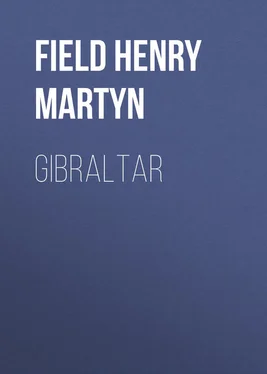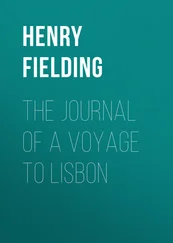Henry Field - Gibraltar
Здесь есть возможность читать онлайн «Henry Field - Gibraltar» — ознакомительный отрывок электронной книги совершенно бесплатно, а после прочтения отрывка купить полную версию. В некоторых случаях можно слушать аудио, скачать через торрент в формате fb2 и присутствует краткое содержание. Жанр: foreign_antique, foreign_prose, на английском языке. Описание произведения, (предисловие) а так же отзывы посетителей доступны на портале библиотеки ЛибКат.
- Название:Gibraltar
- Автор:
- Жанр:
- Год:неизвестен
- ISBN:нет данных
- Рейтинг книги:5 / 5. Голосов: 1
-
Избранное:Добавить в избранное
- Отзывы:
-
Ваша оценка:
- 100
- 1
- 2
- 3
- 4
- 5
Gibraltar: краткое содержание, описание и аннотация
Предлагаем к чтению аннотацию, описание, краткое содержание или предисловие (зависит от того, что написал сам автор книги «Gibraltar»). Если вы не нашли необходимую информацию о книге — напишите в комментариях, мы постараемся отыскать её.
Gibraltar — читать онлайн ознакомительный отрывок
Ниже представлен текст книги, разбитый по страницам. Система сохранения места последней прочитанной страницы, позволяет с удобством читать онлайн бесплатно книгу «Gibraltar», без необходимости каждый раз заново искать на чём Вы остановились. Поставьте закладку, и сможете в любой момент перейти на страницу, на которой закончили чтение.
Интервал:
Закладка:
Henry M. Field
Gibraltar
PREFACE
The common tour in Spain does not include Gibraltar. Indeed it is not a part of Spain, for, though connected with the Spanish Peninsula, it belongs to England; and to one who likes to preserve a unity in his memories of a country and people, this modern fortress, with its English garrison, is not "in color" with the old picturesque kingdom of the Goths and Moors. Nor is it on the great lines of travel. It is not touched by any railroad, and by steamers only at intervals of days, so that it has come to be known as a place which it is at once difficult to get to and to get away from. Hence easy-going travellers, who are content to take circular tickets and follow fixed routes, give Gibraltar the go-by, though by so doing they miss a place that is unique in the world – unique in position, in picturesqueness, and in history. That mighty Rock, "standing out of the water and in the water," (as on the day when the old world perished;) is one of the Pillars of Hercules, that once marked the very end of the world; and around its base ancient and modern history flow together, as the waters of the Atlantic mingle with those of the Mediterranean. Like Constantinople, it is throned on two seas and two continents. As Europe at its southeastern corner stands face to face with Asia; at its southwestern it is face to face with Africa: and these were the two points of the Moslem invasion. But here the natural course of history was reversed, as that invasion began in the West. Hundreds of years before the Turk crossed the Bosphorus, the Moor crossed the Straits of Gibraltar. His coming was the signal of an endless war of races and religions, whose lurid flames lighted up the dark background of the stormy coast. The Rock, which was the "storm-centre" of all those clouds of war, is surely worth the attention of the passing traveller. That it has been so long neglected, is the sufficient reason for an attempt to make it better known.
CHAPTER I.
ENTERING THE STRAITS
I heard the last gun of the Old Year fired from the top of the Rock, and the first gun of the New. It was the very last day of 1886 that we entered the Straits of Gibraltar. The sea was smooth, the sky was clear, and the atmosphere so warm and bright that it seemed as if winter had changed places with summer, and that in December we were breathing the air of June.
On a day like this, when the sea is calm and still, groups of travellers sit about on the deck, watching the shores on either hand. How near they come to each other, only nine miles dividing the most southern point of Europe from the most northern point of Africa! Perhaps they once came together, forming a mountain chain which separated the sea from the ocean. But since the barrier was burst, the waters have rushed through with resistless power. Looking over the side of the ship, we observe that the current is setting eastward, which would not excite surprise were it not that it never turns back. The Mediterranean is a tideless sea: it does not ebb and flow, but pours its mighty volume ceaselessly in the same direction. This, the geographers tell us, is a provision of nature to supply the waste caused by the greater evaporation at the eastern end of the Great Sea. But this satisfies us only in part, since while this current flows on the surface, there is another, though perhaps a feebler, current flowing in the opposite direction. Down hundreds or fathoms deep, a hidden Gulf Stream is pouring back into the bosom of the ocean. This system of the ocean currents is one of the mysteries which we do not fully understand. It seems as if there were a spirit moving not only upon the waters, but in the waters; as if the great deep were a living organism, of which the ebb and flow were like the circulation of the blood in the human frame. Or shall we say that this upper current represents the Stream of Life, which might seem to be over-full were it not that far down in the depths the excess of Life is relieved by the black waters of Death that are flowing darkly beneath?
Turning from the sea to the shore, on our left is Tarifa, the most southern point of Spain and of Europe – a point far more picturesque than the low, wooded spit of land that forms the most southern point of Asia, which the "globe-trotter" rounds as he comes into the harbor of Singapore, for here the headland that juts into the sea is crowned by a Moorish castle, on the ramparts of which, in the good old times of the Barbary pirates, sentinels kept watch of ships that should attempt to pass the Straits from either direction: for incomers and outgoers alike had to lower their flags, and pay tribute to those who counted themselves the rightful lords of this whole watery realm. I wonder that the Free-Traders do not ring the changes on the fact that the very word tariff is derived from this ancient stronghold, at which the mariners of the Middle Ages paid "duties" to the robbers of the sea. If both sides of the Straits of Gibraltar were to-day, as they once were, under the control of the same Moslem power, we might have two castles – one in Europe and one in Africa – like the "Castles of Europe and Asia," that still guard the Dardanelles, at which all ships of commerce are required to stop and report before they can pass; while ships-of-war carrying too many guns, cannot pass at all without special permission from Constantinople.
But the days of the sea-robbers are ended, and the Mediterranean is free to all the commerce of the world. The Castle of Tarifa is still kept up, and makes a picturesque object on the Spanish coast, but no corsair watches the approach of the distant sail, and no gun checks her speed; every ship – English, French, or Spanish – passes unmolested on her way between these peaceful shores. Instead of the mutual hatred which once existed between the two sides of the Straits, they are in friendly intercourse, and to-day, under these smiling skies, Spain looks love to Barbary, and Barbary to Spain.
While thus turning our eyes landward and seaward, we have been rounding into a bay, and coming in sight of a mighty rock that looms up grandly before us. Although it was but the middle of the afternoon, the winter sun hung low, and striking across the bay outlined against the sky the figure of a lion couchant – a true British lion, not unlike those in Trafalgar Square in London, only that the bronze is changed to stone, and the figure carved out of a mountain! But the lion is there, with his kingly head turned toward Spain, as if in defiance of his former master, every feature bearing the character of leonine majesty and power. That is Gibraltar!
It is a common saying that "some men achieve greatness, and some have greatness thrust upon them." The same may be said of places; but here is one to which both descriptions may be applied – that has had greatness thrust upon it by nature, and has achieved it in history. There is not a more picturesque spot in Europe. The Rock is fourteen hundred feet high – more than three times as high as Edinburgh Castle, and not, like that, firm-set upon the solid ground, but rising out of the seas – and girdled with the strongest fortifications in the world. Such greatness has nature thrust upon Gibraltar. And few places have seen more history, as few have been fought over more times than this in the long wars of the Spaniard and the Moor; for here the Moor first set foot in Europe, and gave name to the place (Gibraltar being merely Gebel-el-Tarik, the mountain of Tarik, the Moorish invader), and here departed from it, after a conflict of nearly eight hundred years.
Читать дальшеИнтервал:
Закладка:
Похожие книги на «Gibraltar»
Представляем Вашему вниманию похожие книги на «Gibraltar» списком для выбора. Мы отобрали схожую по названию и смыслу литературу в надежде предоставить читателям больше вариантов отыскать новые, интересные, ещё непрочитанные произведения.
Обсуждение, отзывы о книге «Gibraltar» и просто собственные мнения читателей. Оставьте ваши комментарии, напишите, что Вы думаете о произведении, его смысле или главных героях. Укажите что конкретно понравилось, а что нет, и почему Вы так считаете.












